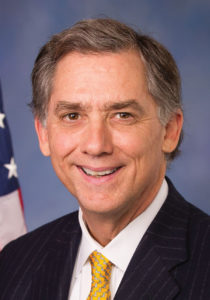
Voters in central Arkansas’ 2nd District might, possibly, maybe experience something that doesn’t happen that much in congressional races – a real, contested campaign. That’s because national Democrats are targeting that race to try to unseat the Republican congressman, Rep. French Hill.
Hill was re-elected easily in 2016 with 58 percent of the vote against an uncompetitive Democrat and a Libertarian. His was one of many Arkansas races where the outcome was never in doubt. Democrats didn’t even field candidates in the other House elections. President Trump was such a shoo-in that Hillary Clinton, Arkansas’ former first lady, didn’t campaign here.
This time, the Democratic Congressional Campaign Committee (DCCC), the House Democrats’ campaign arm, has made the 2nd District one of its targeted races. It already has run radio ads attacking Hill.
2nd District state’s most competitive
If any of the state’s four congressional districts could be competitive, it’s the 2nd. Its largest county, Pulaski, home of Little Rock, narrowly voted for Democrat Dianne Curry in 2016. Hill beat her because he dominated the suburban and outlying counties: Saline, Faulkner, White, Van Buren, Conway and Perry.
Democrats will try harder this time. The DCCC was encouraged by last week’s elections, when Democrats rode a wave of anti-Trumpism and won in some new places. If the party outperformed in Virginia suburbia, the thinking goes, then it could outperform in Little Rock’s suburbs.
But the DCCC had already targeted French Hill before those elections. They’ll try to tie him to an attackable party leader – not President Trump, who’s still somewhat popular in Arkansas, but Speaker Paul Ryan with the rest of the Republican establishment. Regional Press Secretary Cole Leiter said it will use against Hill his vote to repeal the Affordable Care Act (Obamacare) along with his support of the Republicans’ tax plan.
French Hill’s advantages
Even if Democrats implement their strategy, they’ll have quite a Hill to conquer. Hill won 65,000 more votes than Curry. Republicans dominate Arkansas and the South, outnumbering Democrats 99-39 in the House in states that were in the Confederacy. As of Sept. 30, Hill reported having almost $1.2 million in cash on hand, according to the Center for Responsive Politics’ OpenSecrets.org website. In contrast, the two Democrats in the race, Paul Spencer and Gwendolynn Combs, had $8,000 between them. And unlike the DCCC, it’s safe to say Hill won’t consider his vote to repeal Obamacare a liability.
Just because Hill has been targeted doesn’t mean he will stay that way. How much money the DCCC commits to spending will signal how competitive the race really has become.
Regardless, it’s hard to see Hill losing in this climate. Moreover, the state’s other Republican congressmen are safe. That would be Rep. Rick Crawford in eastern Arkansas’ 1st District, Rep. Steve Womack in Northwest Arkansas’ 3rd District, and Rep. Bruce Westerman in the far-flung 4th District. The DCCC isn’t targeting any of them.
Could the House flip?
Meanwhile, the election could affect Arkansas in a big way: Its four congressmen could become members of the minority party. Democrats must flip 24 Republican-held seats to win back the House. That could happen because the party that loses the White House one year tends to win big in the midterm elections two years later. Two years after President Obama was elected, Democrats lost 63 House seats. Presidents Reagan’s and Clinton’s parties lost big in their first mid-term House elections as well.
That would be a big deal. A senator from the minority party can at least block legislation. A House member from the minority party can’t get much done. Of course, neither can members of the majority party these days.
Regardless of your political philosophy, the possibility of a competitive campaign is a welcome sign, despite all the nasty commercials it inevitably will bring. Both parties in recent years have written off too many districts and states as unwinnable. Understandably, they want to efficiently deploy their resources. But doing so deprives voters of choices and encourages states and districts to become one-party regional voting blocs.
Without choices, an election is just a coronation, which is kind of beside the point.
Related: Paying for this storm, and the storms to come
By Steve Brawner, © 2017 by Steve Brawner Communications, Inc.